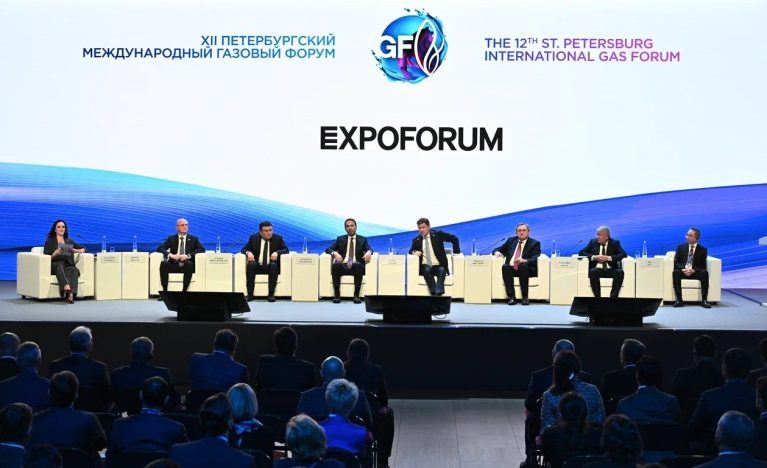
The key result of the plenary session GLOBAL NATURAL GAS MARKET TRANSFORMATION: CHALLENGES AND WAYS OF DEVELOPMENT held during SPIGF 2023 was confirmation of the planned long-term collaboration with the partner countries.
In the next 25 years, the world’s gas demand is expected to increase by 43%. ‘Gas market development paths will be identified in the new economic development global centres – the countries of the Global South and the Asia-Pacific Region, which Russia is currently building robust relations with,’ stated Alexey Miller, Chairman of the Management Committee of Gazprom.
He also mentioned that Gazprom has been working with its colleagues from Kazakhstan, Uzbekistan, and Kyrgyzstan for dozens of years. However, now these collaborations have moved to a new level. The parties are setting objectives for the next 15 years and establishing a long-term contractual framework for their relations.
Mr. Miller announced that they intend to further increase Russian gas supplies via the Central Asia – Center gas pipeline system directly to consumers in Kazakhstan, Uzbekistan, and Kyrgyzstan.
‘Another urgent issue is gas infrastructure expansion. These countries have real potential for our collaboration as regards to gasification. For instance, we have a remarkably long common border with Kazakhstan, and the Central Asia – Center gas pipeline is just one gas corridor. There are more, for instance, Bukhara – Ural. We are considering this gas corridor and other gas transportation routes that can be established – including the one that would make gas supply to Astana possible,’ said Alexey Miller.
While the industry keeps growing dynamically, we have to deal with the lack of gas. Some of the Russian regions still exist without gas supply, and prompt steps are required to remedy this situation. Connection of gas transportation systems between Kazakhstan, Russia, and Uzbekistan gives us a great privilege for development,’ confirmed Roman Sklyar, First Deputy Prime Minister of the Republic of Kazakhstan.
‘Gazprom came to us in 2014. At that moment, only 22% of the Kyrgyzstan population could use gas supply. Today, this value has risen to 38%, and by 2030 we expect 60% of the local to have access to gas,’ said Taalaibek Ibraev, Minister of Energy of the Kyrgyz Republic.
Moreover, the Republic of Uzbekistan is also determined to become a party to the long-term collaboration. ‘The annual natural population increase in our Republic reaches 1 mln people, and along with the economy growth rates it requires a yearly 10 to 15% energy resource growth. Gas consumption continues to raise, too, and in a short term we’ve managed to arrange gas supply to Uzbekistan – thanks to the concerted effort of our teams,’ said Jurabek Mirzamahmudov, Minister of Energy of the Republic of Uzbekistan.
Nikolay Shulginov, Minister of Energy of the Russian Federation, confirmed that at the current stage of development substantial volumes of gas are wanted. ‘At the same time, other factors should be taken into account along with the rising demand for gas. The European Commission has made a uniquely unwise decision of rejecting Russian gas. And first of all, it has resulted in gas consumption reduction in Europe. On the one hand, we can see gas demand decreasing in Europe, but on the other – its increase in the East and the South,’ said Mr. Shulginov. He elaborated further that today Europe has 98% of gas accumulated in its gas storages, but as soon as the weather gets colder, they will need to buy some more gas, which should definitely be taken into account.
The plenary session was also participated by Gazprom’s partners from Turkey and China, who have also confirmed their interest in natural gas.
‘We supply gas to residential houses, industrial facilities, and use it for electric energy production, too. We do need more gas,’ said Alparslan Bayraktar, Minister of Energy and Natural Resources in the Republic of Turkey.
This said, he also mentioned that although Turkey intends to expand its use of renewable energy sources (RES), utilize solar and wind energy potential, and develop the nuclear energy sector, they are also going to consume more natural gas.
Xie Jun, Vice President of the China National Petroleum Corporation, brought into focus that the governors and managers of China see natural gas as a low-carbon and flexible energy source. That’s why its share in both gasification of cities and in the industrial sector will keep growing. ‘By 2030, the demand is going to increase significantly,’ he concluded.
It is worth noting that all the speakers of the plenary session announced their RES development plans formulated for their countries. At the same time, they are sure that natural gas can be used as a means of switching to green energy.
‘Still, natural gas is not just a transitional fuel type. This is an energy tool that is economically justified and is going to stay like that for a rather long time,’ Nikolay Shulginov summarized.
Alexander Beglov, Governor of St. Petersburg, mentioned that the natural gas issue is especially relevant for the north capital of Russia. ‘Our city was the first in Russia to install gas lamps in 1812. In 1835, we established the St. Petersburg Gas Lighting Society, and the first gas factory was built on the banks of the Neva. Today, we have more gas-supplied private premises than any other location in Russia,’ the Governor resumed.